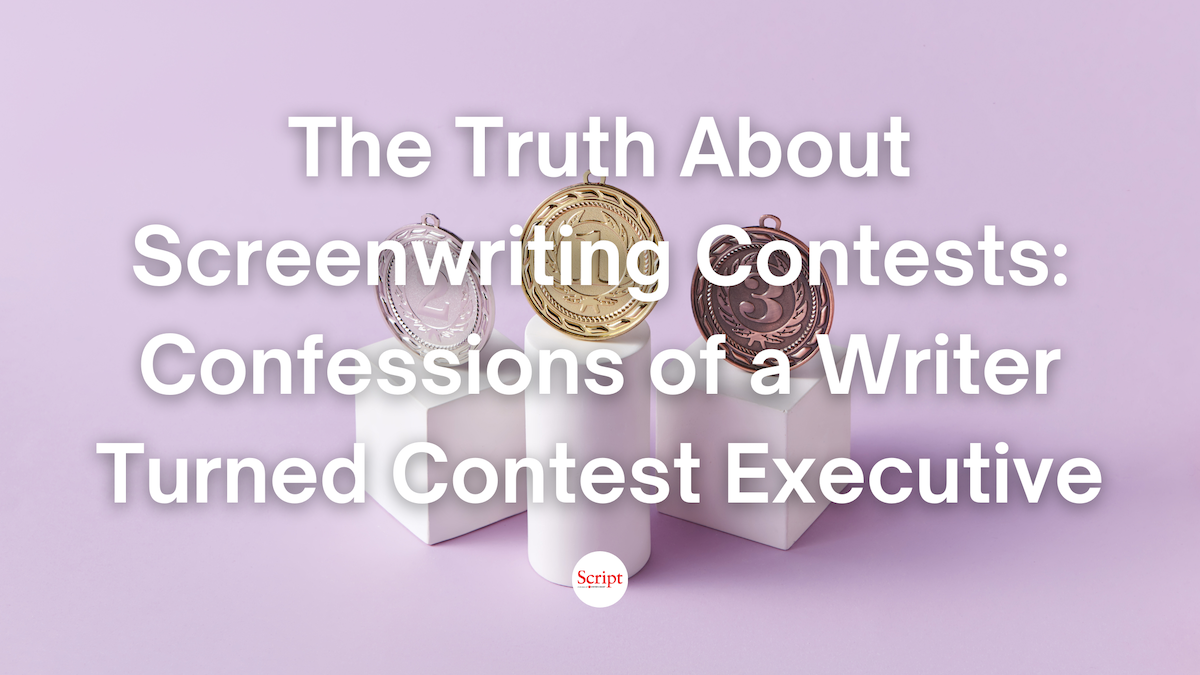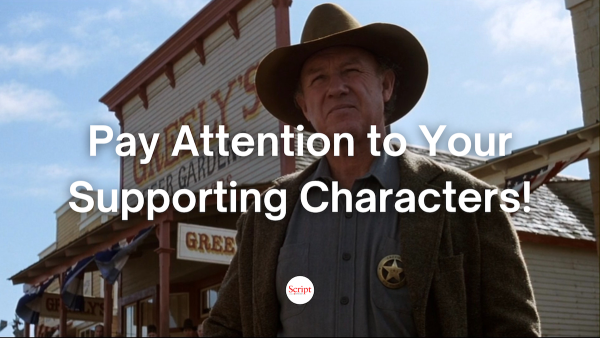BALLS OF STEEL™: Pitching Insights & Tips For Before You Submit Your Script
Editor and screenwriter Jeanne Veillette Bowerman shares post-pitchfest insights and tips for before you submit your script to an executive.
Congratulations to all of the writers who went to Screenwriters World Conference East last weekend in New York City. It was an honor and a pleasure to meet our community of writers and learn alongside you.
Since my return, my inbox has been popping with post-pitchfest questions, starting with the Pitch Slam experience.
I wasn’t pitching anything at this particular event, but I have spent many a day waiting on pitch lines, stepping over writer roadkill and hoping for validation of my work. I do believe it was at a pitching event that I first developed my reputation for tequila as I pulled a mini-bottle out of my purse. But that’s a story for another day.
The morning of the Pitch Slam, I moderated a panel with Eric Faber (Faber Talent LLC), Timothy S. Hays (Hays Media LLC), and Emily Sclar (Judy Boals, Inc). The expert advice was plentiful, but one thing came across more than anything – when you pitch, show who you are, not just what the project is. Agents and managers are building a relationship with their writers. Eric even suggested the writers approach the experience as simply a new opportunity to make friends.
What a great sentiment to take some of the pressure off. These events truly are about making a great first impression, not only with your personality, but also with your work when it arrives in their inbox.
First Step: The Pitch
An exec’s request to read or not read your script isn’t black and white. Marketability, concept, etc. absolutely play a factor, but it’s more complicated than that. Before you beat yourself up if you heard “Pass,” let me try to shed some light on the elusive executive’s mind.
As I walked the Pitch Slam room, the energy was electric. If you have never attended one of these events, it truly is a right of passage for a writer. You get to access executives who will validate your script’s concept and get a chance to practice pitching. Trust me, I have used my years of experience speed pitching to help me when I’m in studio meetings.
As writers, we get opportunities to pitch, but what was it like to be the pitchee? What goes on inside the exec’s mind as we present them with our cherished babies?
Manager Eric Faber graciously offered me the chance to sit with him and hear pitches. I jumped at it. It was an absolute honor to listen to the writers share with us their projects and hard work. What fascinated me wasn’t how the pitching went; it was Eric’s style at hearing pitches.
In every pitch event I’ve attended, I’ve walked up to the exec, shook their hand and launched into an introduction of myself and my pitch, followed by a discussion. Eric has a totally different approach. He didn’t want to hear a two-minute prepared pitch. He wanted his prospective clients to give him the guts of the story in no more than 15 seconds. Let me tell you that threw 95% of the writers before him.
My lessons from Eric:
- Be prepared for anything when you’re pitching
- Know your story inside and out
- Just because you have a prepared pitch, doesn’t mean you’ll get to present it in the way you planned
- Your concept needs to have roles great actors want to play
But the biggest lesson of all came from the projects he passed on. In between pitches, he explained his decisions. Basically it boiled down to this:
- If it’s a comedy, the pitch better be funny
- The concept needs to be fresh and not a regurgitation of something already produced
- There were too many Bridesmaids meets The Hangover ideas
- Your idea might be better as a novel than a script. Adapt it.
- But most importantly, while the concept itself could have been amazing, if it wasn’t something he personally could get passionate about, he wasn’t interested in representing it.
Read that last one again. Even with an amazing concept and a great pitch, an executive might pass not because they don’t believe the work is good, but simply because it’s not their personal taste.
It’s not always about you or your work. Sometimes it’s about them. I can hear everyone breathe a sigh of relief. Eric just saved you a major therapy bill.
Step Two: Submit Your Script... Eventually
All execs agreed they’d rather wait four weeks for you to submit your work than submit something the next day and have it subpar. No one has jumped up and down in their office excited to get a piece of crap in their inbox. Your job as a writer is to make it impossible for anyone to pass on your work once they’ve read your words.
Wow them. You have one shot at a first impression.
The first step is to get feedback on your script. Honest feedback, not from your mama, but from other writers or from a professional story consultant who understands what the industry is looking for.
I recently spent four days with Doug Richardson, writer of Die Hard 2, Bad Boys, Hostage, and more as well as author of four novels – his latest, Blood Money, just released. Doug locked me in his office to work on a rewrite of Slavery by Another Name. As a 30-year writing veteran, he had much to teach me. I soaked it in like a sponge. The two biggest takeaways for me were that my task was to write a reading script, not a shooting script. It needed to flow effortlessly and be an enjoyable read. I know what seems obvious, but the scripts we all download are production scripts. Those aren't the ones that got sold. There’s a big difference in how they read.
The second lesson was to make the main characters irresistible to A-list actors. Their agent is the first one to lay eyes on your script, and something as simple as how you describe the character you want their client to play can make them toss your words in the trash.
Go over all your character work, descriptions, dialogue, etc. and ask yourself, if you were that actor, would you want to play that role? (A full list of tips I learned from Doug are in Balls of Steel Goes to the Writing Room and Behind the Lines with DR.)
Give them what they asked for… maybe
Most often, the exec will ask for the full script if they’re interested, but what if they ask for a synopsis or a one sheet? How do you get them to ask for the rest?
For a few of the writers pitching Eric, he asked for something entirely different… a sample scene. If it was a comedy, he wanted one that showed the funny. But mostly, it was a way for him to see a writing sample more relevant than a synopsis. A writer might be wonderful at writing the prose of a synopsis, but not so much when it comes to writing a screenplay.
I loved this idea. For me, I’d much rather have someone read a snippet of my script and be drooling for more than to read a synopsis not necessarily representative of how I can tell a visual story through the vehicle of screenwriting.
In fact, that’s exactly how I won Doug Blackmon over in my quest to adapt his Pulitzer Prize-winning book. After presenting him with outline after outline, I finally sent him sample scenes. That’s what got his attention.
So what to do if they didn’t ask for them?
Send the synopsis or the one sheet and include a sample. Can’t hurt, right? What’s the worst they do? Delete it? But if it’s not attached, you’re guaranteed they’ll never see it.
You have one shot at a first impression. Blow them away.
What if everyone passes?
The harsh reality is, only 2% of scripts in Hollywood ever get a recommend. Out of those, only a fraction get made. Welcome to the world of a screenwriter. It's hard to face that the executive may just not be that into you.
When people pass on my work, I always thank them for their time and ask if they have any notes. I also ask if the writing was to their liking, and if so, may I submit a future script to them. The #1 goal is to keep the door open! Remember, this is about building relationships.
After I’ve analyzed my challenges, I dive into a rewrite to fix whatever wasn’t working. Rewrite, rewrite, rewrite. Here are some of my top tips:
Once I’m confident the script has improved, I start researching companies to pitch from my home office. The 2013 Hollywood Screenwriting Directory gives you contact information for over 2,500 industry insiders. It’s a great place to start. But be realistic about what companies you pitch. Research them. Make sure they’re a good fit. Write a great query letter. Remember, there are as many ways to break in as there are successful writers, so don’t get stuck on the “rules” of querying. Find something that makes you stand out from the crowd. Being original is always appreciated.
Above all, don’t lose faith in yourself or your dreams. One of my more popular posts is Hope vs. Faith. If you feel discouraged, give it a read. It might help you stay in the game another day. As long as you don’t quit, you still have a shot.
I’m sure there are many of you who can offer more advice, so please help out your fellow writers in the comment section and toss out some tips of your own! What I love most about this column is learning from all of you.
Please keep us all posted on your success and what you’ve learned from the process. I’m rooting for all of you – we’re not competitors, we’re a community.
Get your FREE Pitchfest Checklist to increase your chances of pitching success!
Get query tips in our FREE Download Querying Screenwriting Executives 101
Jeanne Veillette Bowerman is a Senior Executive at Pipeline Media Group and Book Pipeline, Editor-in-Chief of Pipeline Artists, Director of Symposium—a year-round conference in the arts, co-host "Reckless Creatives" podcast, partner at Fringe Press, former Editor-in-Chief of Script magazine and a former Senior Editor at Writer's Digest. Recognized as one of the "Top 10 Most Influential Screenwriting Bloggers," her "Balls of Steel" column was selected as recommended reading by Universal Writers Program. A compilation of her articles is now available at The Writers Store—Balls of Steel: The Screenwriter's Mindset. She is also Co-Founder and moderator of X's weekly screenwriters’ chat, #Scriptchat, and wrote the narrative adaptation of the Pulitzer Prize-winning book, Slavery by Another Name, with its author, Douglas A. Blackmon, former senior national correspondent of The Wall Street Journal. More information can be found on her website. X: @jeannevb | IG/Threads: @jeannevb_ | BlueSky: @jeannevb.bsky.social







